Article menu:
- Who is Dolokhov
- Image prototypes
- The appearance of Fedor Dolokhov
- Military service
- Personality characteristic
- Understanding Friendship
- The relationship of the hero with other characters in the novel
- Dolokhov and Sonya
- Dolokhov and Pierre
- How does Pierre feel about Dolokhov?
- Analysis of the meaning of the duel
- Dolokhov and Helen
- Dolokhov and Rostov
- Meanings of the card game
Roman L.N. Tolstoy’s “War and Peace” is full of conflicting characters. Naturally, in real life, as, indeed, in literature, people cannot be divided according to the principle of positive-negative. In any person you can find character traits that cause admiration and respect, as well as repulsive. Our opinion about this or that person is formed mainly from the perception of the qualities that prevail in the character.
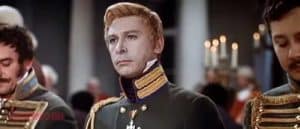
In relation to the characters of “War and Peace” this trend is much more complicated by the fact that we see many heroes acting in two guises – at the front and in everyday, civil life. The image of Fyodor Ivanovich Dolokhov is most actively, which is not typical for most images of aristocrats, is revealed on the battlefield, and not in everyday life.
Who is Dolokhov
Fedor Ivanovich Dolokhov is a twenty-five-year-old representative of an impoverished noble family. Being a representative of this kind of nobles has always been difficult – their desire to restore the greatness of their fading family often leads to the most bad and ignoble actions. A similar situation has developed with Dolokhov. Spurred on by a thirst for material improvement of his abilities, he often acts in a not very pleasant way.
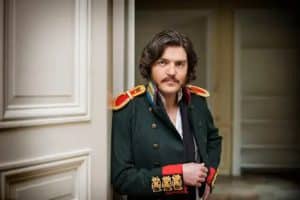
Fedor Ivanovich received a good education. He is smart and educated. Dolokhov is not married. He has a mother and sister – this is his whole family. Tolstoy does not describe his childhood and the stage of growing up – we get to know Fyodor Ivanovich already during his military service.
Image prototypes
The prototypes for creating the image of Fedor Ivanovich Dolokhov were three people at once – Figner Alexander Samoilovich, Dorokhov Ivan Semenovich and Tolstoy Fedor Ivanovich (“The American”).
Alexander Samoilovich was the commander of a partisan detachment during the military events of 1812. He became the prototype of Dolokhov after his duel with Pierre Bezukhov and his demolition. He, like Figner, was awarded “George”.
Dorokhov Ivan Semenovich also took part in the military campaign against Napoleon, was repeatedly presented with an award. Dolokhov was copied from him during his service as an officer. The names of Ivan Semenovich and Fedor Ivanovich are very similar – they are distinguished by only one letter, it can be assumed that Tolstoy did this in order to draw an analogy between these people.
We suggest that you familiarize yourself with the “Characteristics of Pierre Bezukhov” in the novel by Leo Tolstoy “War and Peace”.
The last to partially “give” Tolstoy the material for the image of Dolokhov was Fedor Ivanovich Tolstoy. As you can see, Dolokhov and Tolstoy are namesakes, it is likely that Lev Nikolayevich used such a name and patronymic of his hero in order, like the situation with a surname, to emphasize the analogy with a real person.
Fedor Ivanovich Tolstoy became Dolokhov’s prototype in civilian life. He, like a literary hero, was known as a rake, a frequent participant in duels and card games.
The appearance of Fedor Dolokhov
Fedor Dolokhov looks very handsome and well built: “curly and with light blue eyes. He was twenty-five years old. He did not wear a mustache, like all infantry officers, and his mouth, the most striking feature of his face, was completely visible. The lines of this mouth were remarkably finely curved.” His blond hair lay beautifully on the collar of his shirt.
Dolokhov is of medium height. He has an athletic body. Slender, agile, broad-shouldered, his hands are “reddish, with short fingers.”
He has beautiful eyes, but his gaze is impudent, which repels Dolokhov a little. Fyodor Ivanovich “looked with his cold, glassy, not promising look.”
This fact is offset by a captivating smile. It is worth recognizing that such a smile is not always present on Dolokhov’s face. Most often you can see his “cold smile”.
Dolokhov spoke in a “sonorous, firm, unhurried voice.”
As you can see, Fedor Ivanovich has an attractive appearance, he is well built. His appearance is not without flaws, they appear in the form of a cold look and a smile.
Military service
For Dolokhov, military service is, first of all, an opportunity to stand out, to secure his future. He does not have a passion for military affairs, like Nikolai Rostov. Dolokhov does his job well, but it is not a sense of patriotism or duty that spurs him on, but a desire to become famous and rich.
Fedor Ivanovich is serving in the Semyonovsky regiment, which was considered elite. However, thanks to carousing and duels, Dolokhov often falls into disgrace and loses the rank of officer.
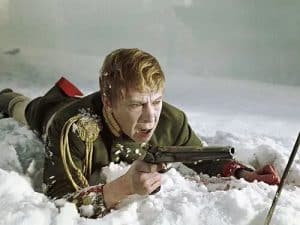
During the military events of 1805-1807, Dolokhov manifests himself as a hero at the front, but again acts for selfish purposes – he needs to regain his officer rank, therefore, he actively focuses on what he did positively during the battle : “I have captured an officer. I stopped the company. – Dolokhov was breathing heavily from fatigue; he spoke with stops. “The whole company can testify. Please remember, Your Excellency.”
From March 1806, Fedor Ivanovich again became a Semenov officer. After the military campaign of 1805-1807, he went first to the Caucasus, then to Persia. His activities in these regions are full of speculation, gossip was actively circulating that Fyodor Ivanovich “was in the Caucasus, and there he fled and, they say, he was a minister in Persia for some sovereign prince, he killed the Shakhov’s brother there.” However, no matter how his service in the Caucasus and Persia developed, in 1811 Dolokhov returned to Moscow.
His revelry and love affair with Elena Bezukhova, nee Kuragina, causes a duel and, as a result, a new demotion in rank.
Dolokhov meets the war with Napoleon as an ordinary soldier. His further service takes place all along the same route of climbing the career ladder. “Now he needs to jump out. He submitted some projects and climbed into the enemy’s chain at night, but well done.
Personality characteristic
What immediately catches the eye in the image of Dolokhov, after his military exploits, is a special relationship with women. They are delighted with him, he often becomes the subject of women’s dreams: “Dolokhov and Kuragin Anatole – all of our ladies were driven crazy.”
Fedor Ivanovich, thanks to his certain share of recklessness, becomes a favorite in society: “they swear by him, they call him like a sterlet.”
Revelry and depravity constantly accompany Dolokhov. He allows you to behave cheekily, often bordering on the concepts of “decent” and “indecent”, so his presence never goes unnoticed.
Such behavior attracts people of different positions and status. The definitions of “rake” and “duelist” were firmly entrenched behind him. It costs him nothing to challenge him to a duel and “to kill a man, it should seem to him that everyone is afraid of him, he should be pleased with this.”
He loves Dolokhov and card games, he plays almost all possible games and wins very often. This gave rise to new rumors that Dolokhov is a cheater. Fedor Ivanovich himself, ironically retells these rumors. “There is a rumor in Moscow that I am a cheat, so I advise you to be careful with me,” he says.
No wonder they say that the eyes of a person are the personification of his soul. Dolokhov’s unpleasant look became an insignificant manifestation of his complex character. He is arrogant and impudent – such a tendency can be traced not only in his civil life, but also in relation to his regimental commanders. “He is very serviceable in the service, but a carachter” – this is how they say about him. Dolokhov is very cunning, he is “a beast, he will crawl everywhere.”
He does not always manage to control himself and his actions, often, he acts extremely aggressively and unbridled. What is true, this state of his can provoke boredom. “Missed by daily life, Dolokhov felt the need for some strange, mostly cruel, act to get out of it.” At such moments, he is ready to shoot the coachman’s horse just like that, or kill a person.
The army knew about his such a terrible character, but they forgave him, no matter what, because “there are not many brave men and sons of the fatherland like him.” He was very brave, brave, ready to accomplish a feat, rumors and stories “about the extraordinary courage and cruelty of Dolokhov with the French” were circulated in the army and admired by many.
Dolokhov has a hard time transitioning from military service to secular receptions – his habit of commanding people (at the front, he most often held commanding positions) does not affect him in the best way. He sometimes forgets where he is – and begins to behave like he would behave in a regiment.
Despite the fact that his attitude towards others is generally hostile, this tendency is not confirmed in relation to his mother and sister. He sincerely loves them, for them he has always “been the most tender son and brother.”
Understanding Friendship
Fedor Ivanovich Dolokhov specifically relates to such a manifestation of human feelings as friendship. Outwardly, he shows this feeling, but if you understand it well, this is only a game for the public, in fact, he does not feel gratitude or a sense of kinship with the person whom he calls his friend. Dolokhov does this out of the same desire to be famous and rich. He successfully uses the position in the society of his friends, their material assets, but in return he is ready to carry out the most reckless acts.
Actively in the novel, Dolokhov appears in the novel in the company of Anatole Kuragin – the same rake as himself, but in this case, he is guided by a feeling of attachment to Anatole’s wallet.
Fedor Ivanovich does not avoid any ways to get rich – he dishonestly, with the help of deceit, beats Nikolai Rostov at cards. Why he did not support Rostov and did not make friends with him is an incomprehensible question. The Rostov family was widely known in high society, people had a high opinion of the Rostovs, so such an acquaintance would help Dolokhov to consolidate his position in society, but he prefers this easy benefit in the form of money. It is possible that Dolokhov counted on the fact that Rostov would die and this friendship would not give the desired result, or it is possible that the fact that Fedor Ivanovich played here is too different in his perception of the world and attitude towards people, compared to Nikolai Rostov. The notion that such communication will be too conflicting and does not correspond to his usual state of affairs, will not lead to the desired result, provokes such dishonest behavior of Dolokhov towards Rostov. He strives to get at least something.
In general, his attitude towards people is strange – he does not feel either gratitude or affection. He knows how to arrange things in such a way as to get the maximum benefit from his pseudo friendship. Dolokhov did not curry favor with more successful people, expecting handouts from them, but skillfully “used and amused” people.
Thus, Fedor Ivanovich Dolokhov is a very specific character. He is not devoid of positive qualities of character, but several negative qualities cross out everything positive in him – the reader perceives him, first of all, as a deceiver, a rake and a duelist.
The relationship of the hero with other characters in the novel
Dolokhov and Sonya
The author of War and Peace describes Sonya Rostova as a truly ideal girl. Cute and smart, modest and kind, Sonya suffered from only one thing – from her position. This was the secondary position of a dowry. Sonechka was a poor relative of the Rostovs, whom a meek family sheltered at home, raising her along with the rest of the children. Sonya, in particular, was friends with Natasha. Dolokhov is the embodiment of an insidious character, because the hero, in a sense, violates the integrity of the Rostov family. At least, it definitely encroaches on the world in this nest. Dolokhov liked Sonya and the man decided to propose to the girl. However, Sonya refused.
In this situation, it should be noted, another side of Dolokhov’s personality is revealed: the reader is accustomed to considering the hero a gambler, a reveler, a player who liked to rage and was distinguished by a daring character. But having fallen in love with Sonya, Dolokhov shows the gentle, sincere and cordial side of his nature. In fact, not so poor Dolokhov is a good match for a girl who does not have a penny for her soul. The countess – the mother of Nikolai Rostov, who had tender feelings for Sonya – also wanted to get rid of the poor relative. In addition, the girl interfered with the countess, because Nikolai did not want to look for a richer bride more suitable in status. Due to attachment to the Rostov family (and to Nikolai in particular), Sonya rejects Dolokhov’s offer, remaining in the same place. The fate of the girl is unenviable. Nikolai nevertheless marries a rich princess, Natasha, a childhood friend, considers Sonya lower in dignity, because she is an “empty flower”, a person who is not capable of the same feelings as she is Natasha. Only Dolokhov was able to discern in Sonya something more – real, deep.
Dolokhov and Pierre
He is too noble and pure in soul … for our current, corrupt world … Well, tell me, Count, is this fair, is it honestly from Bezukhov? .. Do these people have feelings, honor! Knowing that he is the only son, challenge him to a duel and shoot so directly! .. What baseness, what disgust! I know you understand Fedya, my dear Count… He is rarely understood. This is such a high, heavenly soul …
Dolokhov’s mother about her son
Dolokhov was not a very rich man, but there was something in Dolokhov that made others respect him. Dolokhov counted only on his own strength, so often those around him saw more dignity in this person than in the same Anatole. Tolstoy describes a company of three people. The company consisted of Dolokhov, Anatole and Pierre. Here, for example, is a description of one of the funs of bosom friends:
… they got a bear somewhere, put it in a carriage with them and took it to the actresses. The police came to take them down. They caught the guard and tied him back to back to the bear and let the bear into the Moika; the bear swims, and the quarterly on it …
However, as we know, this friendship did not end too well. For a prank, Dolokhov lost his officer rank, becoming a simple soldier. Pierre got off with a light punishment (after all, Bezukhov had a fairly high status, and besides, his face was civilian). Anatole was the luckiest of all: the hero remained in the officers. Most of all, it turns out, Dolokhov paid the price. Fedor is a nature, sensitive to injustice, vindictive and cruel. Therefore, the hero wished to take revenge on his ungrateful comrades. Yes, perhaps Dolokhov is characterized by rigidity of character and selfishness, but he is also an infinitely lonely person. One day, Pierre, being drunk, decided on a bet to climb onto an open window and drink a bottle there. Fat, careless Pierre risked his life, but Dolokhov was amused. This point, in particular, leads some critics to speak of Dolokhov’s heartlessness.
Finally, a year has passed since Dolokhov was demoted to the soldiers. Campaigns, reviews, humiliation – all this exhausts the hero, rekindling in Dolokhov’s soul the desire to take revenge. Miraculously, without dying in Austria, Fedor returned to his native land. In Moscow, Dolokhov lives with Pierre. However, even now in the soul of the hero the former anger against his former comrade burns. So, Fedor starts a relationship with Bezukhov’s wife.
How does Pierre feel about Dolokhov?
Pierre – in itself a large, powerful – oddly enough, but he is afraid of Fyodor:
It means nothing to him to kill a man… He must think that I am afraid of him too. And indeed, I am afraid of him …
However, in the end, the storm of indignation that gradually accumulated in Bezukhov’s soul takes over. Pierre boils. But Dolokhov, even observing that the former comrade is on the verge of collapse, still continues his bullying of the poor fellow. The last straw was the toast that Dolokhov said:
To the health of beautiful women, Petrusha, and their lovers…
This infuriated Bezukhov, and he literally attacked Dolokhov. Pierre boldly looked into the “bold, cruel” eyes of an old friend. Finally, Bezukhov challenged Dolokhov to a duel. Sokolniki was appointed as the place, and Nesvitsky, together with Denisov, acted as seconds. The seconds tried to reconcile the opponents, but to no avail. Pierre remained adamant:
No, what is there to talk about!.. It doesn’t matter… You just tell me how to go where and shoot where?..
Despite the fact that Dolokhov knew that Pierre was not trained in shooting, Fedor still did not retreat. It seemed that the fate of Bezukhov in this unequal skirmish was a foregone conclusion, but life decreed otherwise. Pierre fired first – in fear of not shooting himself, and … wounded Fyodor. Thus, the cause of the quarrel is a moral vice, human weakness, fear of intercession, inability to forgive, jealousy, envy, revenge. The finale, or rather the culmination of the relationship between Pierre and Fyodor Tolstoy, leads precisely in the shooting scene. Why, in fact, Dolokhov began to quarrel with Bezukhov? Pierre will say that he “helped” Dolokhov. And this is true, because Fedor wanted to use his comrade to realize his own plans and ambitions. However, only his mother actually knows Dolokhov. The hero has a high, noble nature, which the world hardened too early. Before the Battle of Borodino, Fedor will forget his comrade’s past grievances, asking Bezukhov for forgiveness.
Analysis of the meaning of the duel
As is commonly believed in literary criticism, Bezukhov acted more unconsciously than deliberately, causing a stronger opponent, an experienced soldier, to shoot himself. On the night before the duel, Dolokhov is hanging out, listening to gypsy songs … Fedor knows that Pierre is weaker than him in terms of shooting, and therefore does not worry about the outcome of the duel. And yet, cats scratch at the heart of the hero. When the hour of the duel came, Pierre looks bad: his face turned yellow, his eyes were tired. Dolokhov concludes that the opponent had a sleepless night. This gives Fedor confidence in victory:
For about three minutes everything was already ready, and yet they hesitated to start. Everyone was silent…
But, as a result, Bezukhov is lucky, and Fedor missed when shooting. The result – all the heroes are aware of their mistakes. Pierre is sorry that Dolokhov is wounded. But the enemy does not know pity. But at the same time, Dolokhov thinks not about revenge, not about his own interests, but about how his mother will suffer. Pierre is characterized not so much by fear as by humanism. Even in a situation of extreme danger, Bezukhov wanted to find an excuse for an old comrade. Pierre knew what Helen was capable of, knew about his wife’s inclinations, and therefore did not doubt Kuragina’s guilt:
Maybe I would have done the same in his place, thought Pierre. “Even I would probably do the same. Why this duel, this murder?
Dolokhov and Helen
A fleeting romantic relationship was associated with Helen Dolokhova. The beginning of this relationship, meanwhile, was not at all feelings, that is, not love or passion at all. No. Dolokhov was just still angry with Pierre (remember that ill-fated story that caused Fyodor to be demoted to a soldier?). Therefore, returning from the campaign, Dolokhov settled with Pierre. Here, the attention of the young man was attracted by the beautiful, but windy, frivolous wife of Bezukhov, Helen. At the same time, Helen was the sister of another enemy of Dolokhov – Anatole, so it seemed that this was the perfect revenge. From this side, nothing justifies Dolokhov’s connection with Helen. Fedor is indifferent to secular beauties. This is just entertainment, an attempt at cold revenge. An act out of jealousy, because Dolokhov seems unfair that Bezukhov got everything – a beautiful wife, wealth, and status. Therefore, Fedor wants, by all means, to disgrace his former friend. And Pierre knows this:
Dolokhov will not stop at disgracing an old friend. It would be a special charm for him to dishonor my name and laugh at me, precisely because I … helped him …
Dolokhov acted vilely. Bezukhov, although he was distinguished by some naivety, nevertheless suspected something was amiss. To finally make sure that Helen is cheating on him with Fedor, Pierre is helped by a letter. This message was sent by an anonymous person. It told in detail about the vileness of the guest whom Bezukhov sheltered at his home. Tolstoy is a master of psychologism when he describes the dinner scene that took place in the English Club. Here Bezukhov pondered the letter, the sad and humiliating news that had come. By the look of Dolokhov, one could understand that something “ugly” was going on in Fyodor’s soul. However, Bezukhov still lost his temper and, as we remember, called Dolokhov to shoot himself.
In this situation, meanwhile, the writer rather once again reveals the low and insignificant nature of Helen. It is not enough to be born into a noble family in order to have a pure and morally exalted personality. Is a fallen woman worth someone’s death? Is the baseness of a man worth murder, sin? Such questions are asked by Pierre before a duel with a former comrade. Bezukhov regrets that he married Helen. After the duel ended, Fedor was taken home. Rostov, by the way, found out that Dolokhov was a “buoy, a bully”, on the one hand, on the other, a kind and caring son who took care of his old mother and sick sister. Thus, the writer shows that life is not as clear and obvious as people sometimes think. Life is relative, ambivalent, ambiguous. And every person in the soul has both light sides and dark ones.
Dolokhov and Rostov
The relationship between Fedor and Nikolai is an example of how easily friendship sometimes turns into enmity. The process of destruction of friendly relations is also depicted in Tolstoy’s epic. So, why did two friends, two comrades, Dolokhov and Nikolai, quarreled? Probably due to the fact that both young men loved the same girl. Fedor makes a proposal to his beloved – Sonya, but she refuses to marry him, because she loves another person. That person is Nicholas. Then Fedor decides to avenge his ruined family happiness. It should be noted here that this was also the destruction of the only happiness for family happiness for Sonya, because the girl, in the end, will be left alone.
Fedor’s nature is sharp and quick-tempered. In addition, Dolokhov is an avid and experienced gambler. In one insidious card game called “Pharaoh”, Fedor manages to beat Rostov. Now Nikolai owes Fedor a huge amount of money. The game instills in Dolokhov the confidence that he is a “romantic”, “fatal man”. Meanwhile, Dolokhov does not cheat – we draw such a conclusion indirectly, because the author of the work does not say anything about Fyodor’s dishonesty, cheating or fraud. However, Dolokhov himself warns Nikolai that it is dangerous to play with him, because there are rumors that he is a cheater. And besides – “who is unhappy in love, he is lucky in the game.” But Rostov can no longer refuse, because then the young man will lose face. Fedor set out to ruin Rostov for forty-three thousand. This begs the question: why did Dolokhov choose such an amount? It’s simple: forty-three is the sum of Dolokhov’s age and Sonya’s age. In this episode, the reader sees Dolokhov as sensual and vulnerable. And when Fedor beats Nikolai, for some reason we regret neither the loser, but the winner.
Meanings of the card game
In the scene of the card game, the reader is surprised and even frightened by Fyodor’s “demonism”. This is facilitated by the atmosphere that Tolstoy creates. For example, the author writes:
The game went on; the footman, without ceasing, served champagne …
In this strange and inviting atmosphere, Fedor often psychologically puts pressure on the enemy, constantly focusing on Nikolai’s fear. More specifically, on the fact that Rostov is afraid of the game, afraid of losing, and of Dolokhov himself.
I give to others, but I beat you. Are you afraid of me? – he repeated <…> So you are not afraid to play with me? repeated Dolokhov, and, as if to tell a merry story, he laid down his cards, tipped over on the back of his chair…
However, an attempt at revenge and even winning does not bring Dolokhov the desired satisfaction. Thoughts about Sonya do not leave the head of our hero. Soon Fedor will take part in another obscene, low event: he will become Anatole’s accomplice. The situation is this: Kuragin planned to steal and take away Natasha, the youngest daughter of the Rostovs. And Fedor helped Anatole in this matter. It was all a couple of months after Sonya rejected Dolokhov’s offer. They say that Fedor is a terrible person, because for his age he managed to sip an abnormally lot of experience. Dolokhov realized a simple truth: honest, courageous, intelligent and talented people are not valued in this world and in this society. It was the truth of life that broke Fedor, giving rise to that very cynicism and that cruelty.
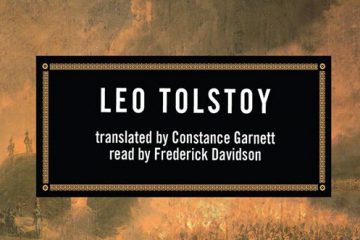
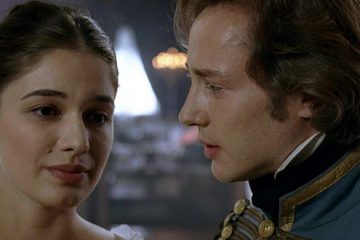
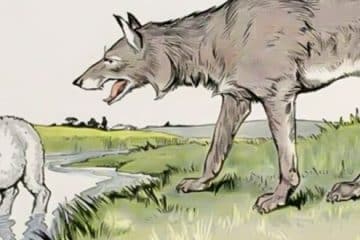
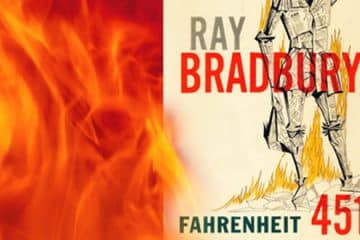

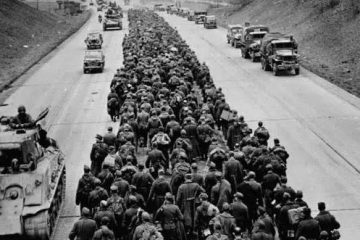
A very interesting analysis of personalities, in my opinion. Tolstoy, always writes a detailed descriptions of personalities, relationships, and very complex motivations, and in the end, all the characters are very similar to real people, and their actions are similar to the actions of real people! A very long and very difficult novel to read, but after reading it, you become an eyewitness of those times, as if you were a participant in those scenes, you understand the times and culture of that time, so I think that everyone who loves history should read it!